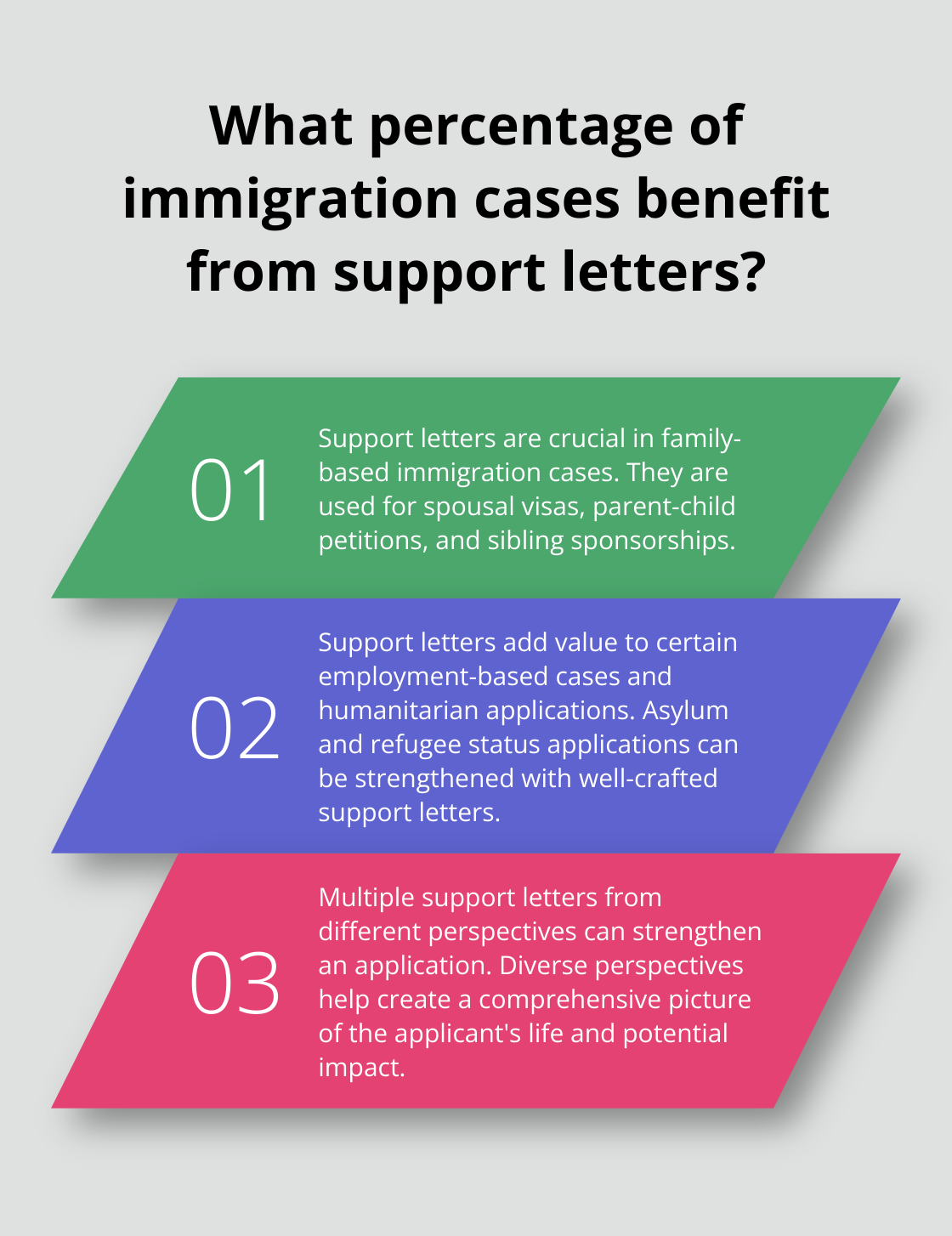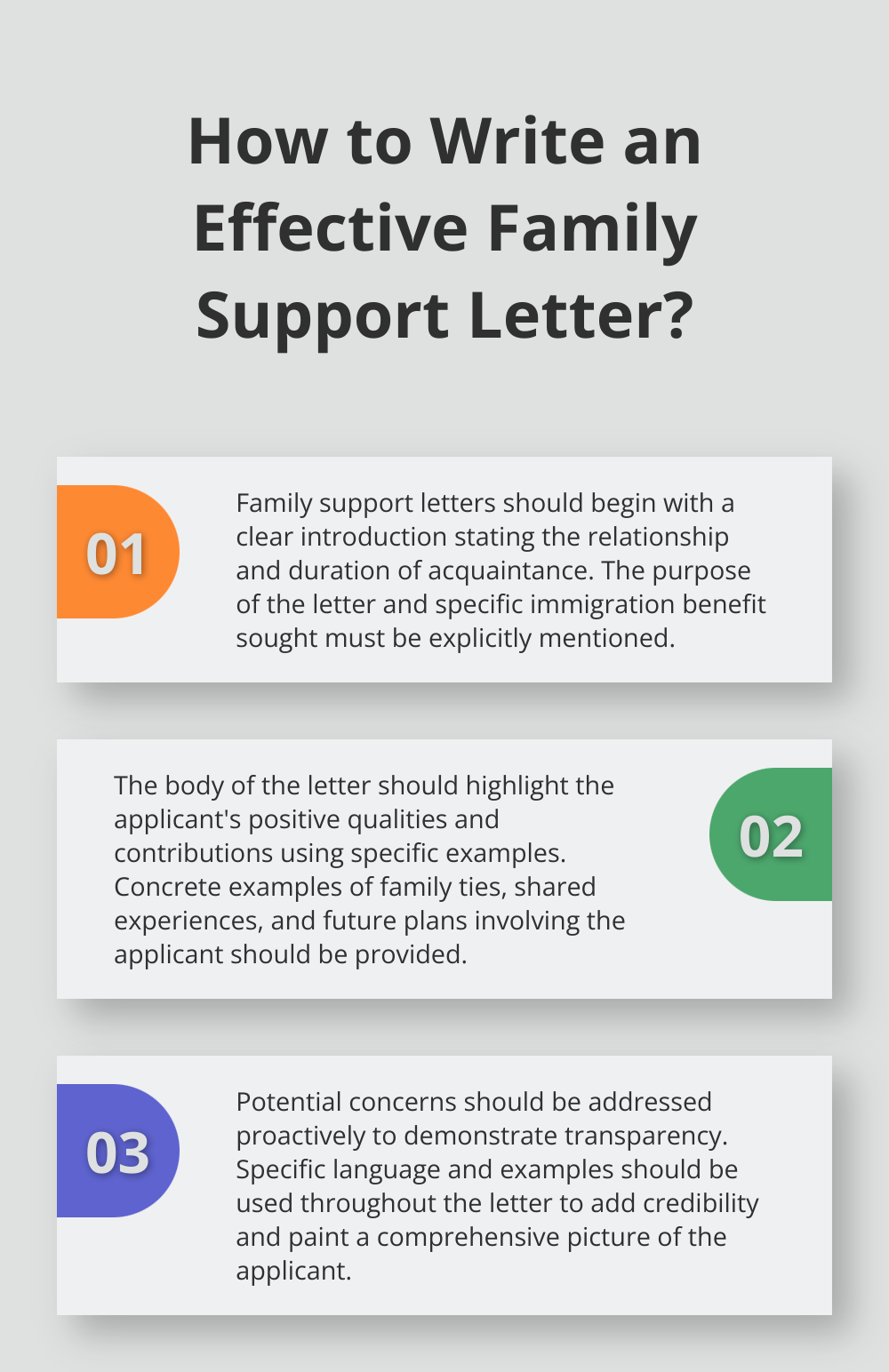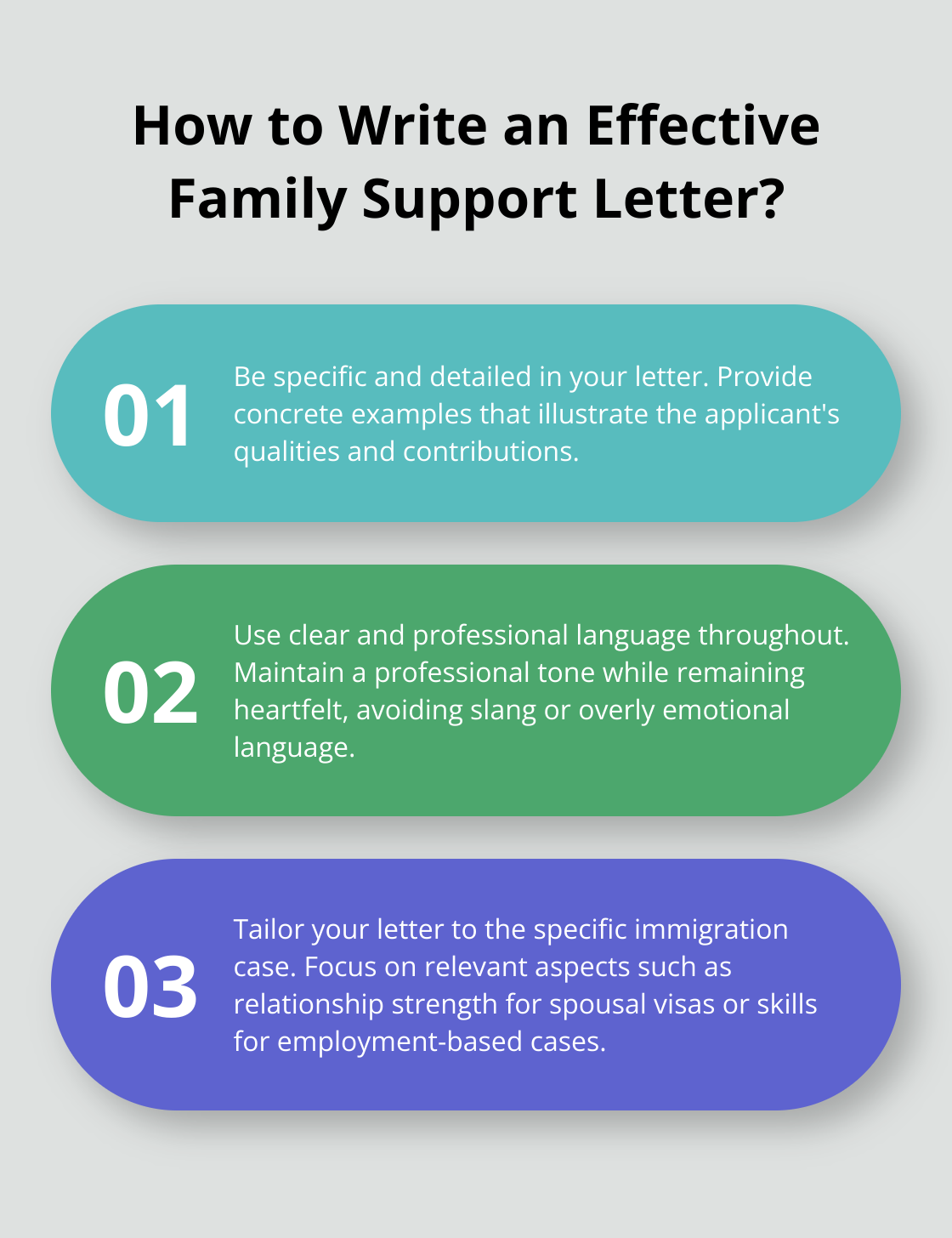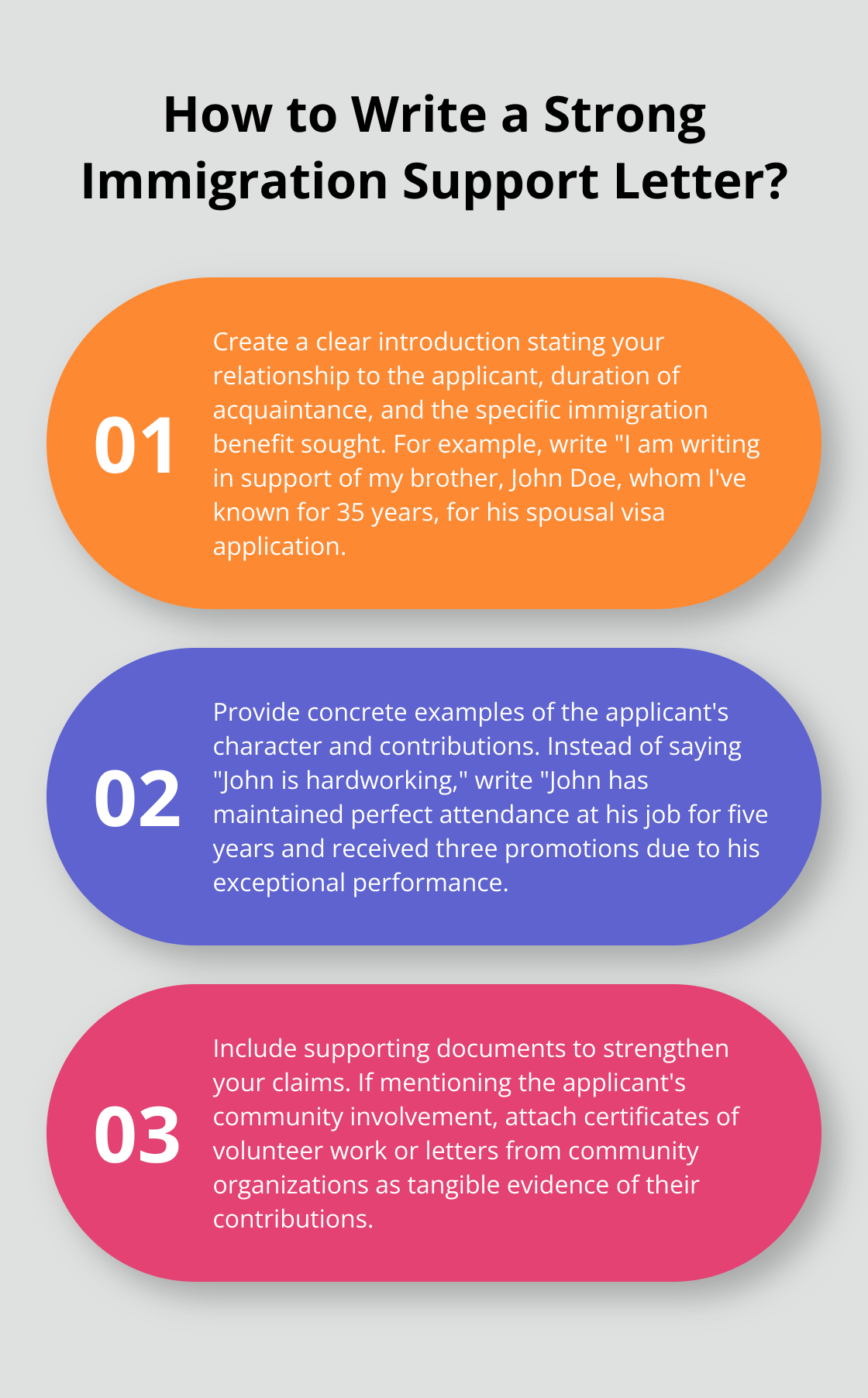
How to Write a Family Support Letter for Immigration
Family support letters play a vital role in many immigration cases, providing crucial evidence of an applicant’s ties and character. At Law Offices of Jeffrey A. Thompson, we often guide clients through the process of crafting these important documents.
Understanding how to write an effective family support letter for immigration can significantly strengthen an application. This guide will walk you through the key elements of a compelling letter, including a family support letter sample for immigration, to help you present your case in the best possible light.
Why Are Family Support Letters Important?
Family support letters serve as powerful tools in the immigration process. These documents provide immigration officials with valuable insights into an applicant’s character, family ties, and potential contributions to society. At Law Offices of Jeffrey A. Thompson, we have observed the significant impact well-crafted support letters can have on immigration cases.
The Role of Support Letters in Immigration Cases
Support letters prove particularly important in family-based immigration cases, such as spousal visas, parent-child petitions, and sibling sponsorships. They also add value to certain employment-based cases and humanitarian applications (e.g., asylum or refugee status). The American Immigration Lawyers Association has been conducting an online survey of attorneys, community-based organizations, and other relevant parties regarding immigration cases.
Key Components of an Effective Support Letter
A compelling family support letter should include specific details about the applicant’s character, their relationship with family members, and their ties to the community. It’s important to provide concrete examples of the applicant’s positive qualities and contributions. For instance, mentioning how the applicant has supported elderly relatives or volunteered in local organizations can paint a vivid picture of their character.
Addressing Potential Concerns
Many people overlook the importance of addressing potential concerns or challenges in support letters. If the applicant has experienced any legal issues or gaps in employment, it’s beneficial to explain these situations honestly and show how the applicant has overcome them. This proactive approach can help alleviate any doubts immigration officials might have.
Tailoring the Letter to the Specific Case
Each immigration case is unique, and the support letter should reflect this uniqueness. For a spousal visa, focus on the strength and authenticity of the relationship. In a parent-child petition, emphasize the emotional and financial support the applicant provides. For employment-based cases, highlight how the applicant’s skills and experience will benefit the U.S. economy.
The Impact of Multiple Support Letters
While quality trumps quantity, multiple support letters from different perspectives can strengthen an application. Reference letters can provide a well-rounded view of the applicant’s character and contributions. These diverse perspectives help create a comprehensive picture of the applicant’s life and potential impact on their new community.

As we move forward, let’s explore the structure and content of an effective family support letter in more detail. Understanding these elements will help you craft a compelling letter that strengthens your immigration case.
How to Structure Your Family Support Letter
Start with a Clear Introduction
Your family support letter for immigration should begin with a clear introduction. State your relationship to the applicant and the duration of your acquaintance. For example, “I write this letter in support of my brother, John Doe, whom I’ve known for 35 years.” This immediately establishes your credibility and connection to the applicant.

Next, explain the purpose of your letter. Specify the type of immigration benefit the applicant seeks (e.g., spousal visa application, parent-child petition). This context helps immigration officials understand the purpose of your letter from the outset.
Highlight Character and Contributions
The body of your letter should focus on the applicant’s positive qualities and contributions to family and community. Use specific examples to illustrate these traits. Instead of simply stating that the applicant is hardworking, describe how they’ve held the same job for ten years and received multiple promotions.
The successful integration of immigrants and their children contributes to economic vitality and to a vibrant and ever-changing culture. This underscores the importance of highlighting these aspects in your letter.
Provide Concrete Examples of Family Ties
Immigration officials want to understand the strength of family relationships. Describe shared experiences, family traditions, or ways in which the applicant has supported family members. You might mention how the applicant cares for elderly parents or regularly attends family gatherings.
Discuss future plans that involve the applicant. This could include upcoming family events, shared business ventures, or plans for the applicant to assist with childcare. These details demonstrate ongoing family ties and the applicant’s importance to the family unit.
Address Potential Concerns Proactively
If the applicant’s history contains potential red flags, address them directly rather than ignore them. For instance, if the applicant has a gap in employment, explain the circumstances and how they’ve since overcome that challenge. This proactive approach shows honesty and can help alleviate concerns immigration officials might have.
The goal is to paint a comprehensive picture of the applicant. Addressing potential concerns demonstrates transparency and provides context that might not be apparent from official documents alone.
Use Specific Language and Examples
Try to use specific language and concrete examples throughout your letter. Instead of saying “John is a good person,” provide examples that illustrate this quality. For instance, “John volunteers at the local food bank every weekend, demonstrating his commitment to community service.”
Specific examples (like dates, places, and events) add credibility to your statements and help immigration officials form a clearer picture of the applicant’s character and relationships.
As we move forward, let’s explore some tips for writing a persuasive family support letter that will strengthen your loved one’s immigration case.
How to Craft a Compelling Family Support Letter
Be Specific and Detailed
Vague statements won’t impress immigration officials. Provide concrete examples that illustrate the applicant’s qualities and contributions. These examples should highlight why the applicant is a valuable addition to the community. Instead of writing “John is hardworking,” you could say, “John has maintained perfect attendance at his job for the past five years and received three promotions due to his exceptional performance.”
Use Clear, Professional Language
Your letter should maintain a professional tone while remaining heartfelt. Avoid slang or overly emotional language. Write clear, concise sentences that convey your message effectively. If English isn’t your first language, ask a native speaker to review your letter for clarity and grammar.
Tailor Your Letter to the Specific Case
Each immigration case is unique, so your letter should reflect the specific circumstances of the application. For a spousal visa, focus on the strength and authenticity of the relationship. In a parent-child petition, emphasize the emotional and financial ties between the applicant and their children. For employment-based cases, highlight how the applicant’s skills and experience will benefit the U.S. economy.
Include Supporting Documents
The letter itself is important, but supporting documents can add significant weight to your claims. If possible, mention any documents or evidence that support your claims (e.g., community service records, letters from organizations). These might include photographs of family events, copies of joint bank statements, or records of shared property ownership. If you mention the applicant’s community involvement, include certificates of volunteer work or letters from community organizations (these provide tangible evidence of the applicant’s contributions).
Avoid Common Pitfalls
Don’t exaggerate or make false claims in your letter. Immigration officials are trained to spot inconsistencies. Stick to the facts and provide honest, genuine support. Also, avoid using generic templates or copying letters from others. Your letter should be personal and specific to your relationship with the applicant.

Final Thoughts
Writing an effective family support letter for immigration requires careful consideration and attention to detail. You must provide specific examples, use clear and professional language, and tailor your letter to the particular case at hand. Sincerity and honesty are paramount when crafting your letter, as immigration officials will spot inconsistencies.

Every immigration case is unique, and complex cases may benefit from professional legal assistance. At Law Offices of Jeffrey A. Thompson, we specialize in immigration law and can provide expert guidance tailored to your specific situation. Our team can help you navigate the intricacies of the immigration process, from paperwork to overcoming legal hurdles.
When looking for a family support letter sample for immigration, keep in mind that your letter should be personal and specific to your relationship with the applicant. Use samples only as a guide to create a unique and heartfelt letter that truly captures your support for your loved one’s immigration case. Your letter could be the key to helping someone achieve their American dream.


